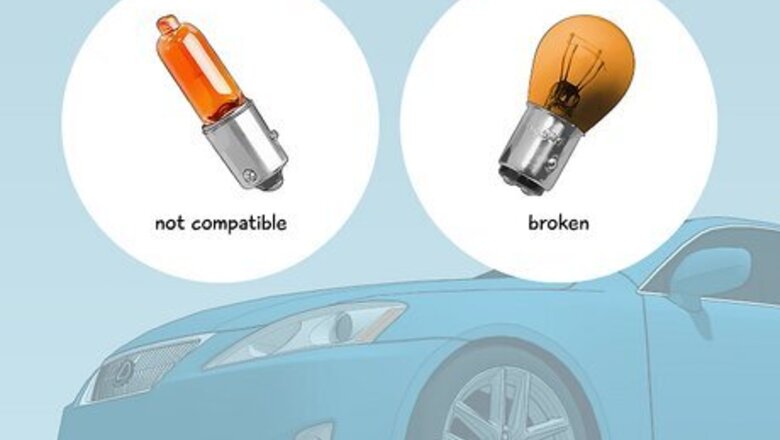
views
Broken Lightbulb
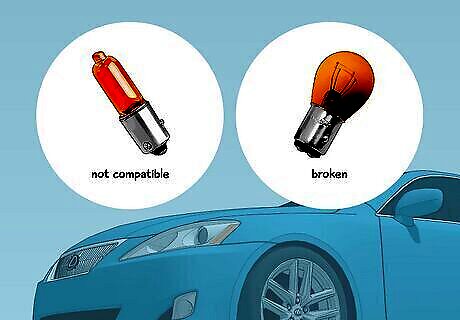
Incompatible or broken bulbs are the most likely culprit. A failed or burned-out lightbulb can send an incorrect current through the indicator system, making it flash rapidly. Generally, this only happens to one turn signal, but it's not uncommon for both bulbs to experience the same problem. Additionally, if you’re using LED lights in an old vehicle, the lights may not be compatible, which causes a quick blinking signal. The Fix: Replace the broken lightbulb. With the engine off, use a screwdriver to remove any covers or trims to access the bulb in the engine compartment, behind the front wheel, or in the trunk. Then, disconnect the wiring connected to the old bulb and insert the new one by twisting it out of the socket. DIY Cost: $25 to $50. Professional Repair Cost: $45 to $100.
Corroded Sockets
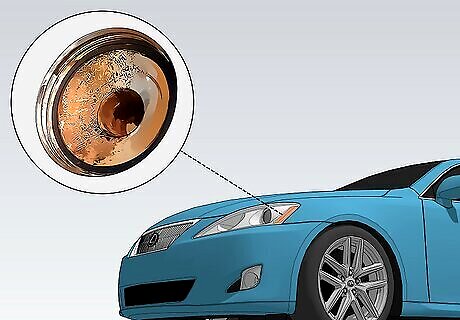
A rusted light bulb socket can block the current from passing through. Debris build-up, like dust, dirt, or rust can prevent the light bulb from working efficiently. This may cause the signal light to blink faster or inconsistently. The Fix: Remove the bulb, inspect the socket, and look for signs of rust or green and dark brown debris around the base. Use a screwdriver or a similar tool to scrape the debris while the car is off. Then, replace the bulb and test it out. Some users recommend cleaning with equal parts isopropyl alcohol or white vinegar and water to break down corrosion. Apply the mixture with a cotton swab or soft cloth. Then, dry the area thoroughly before proceeding. DIY Cost: $0. Professional Replacement Cost: $60 to $150.
Bad Turn Signal Relay
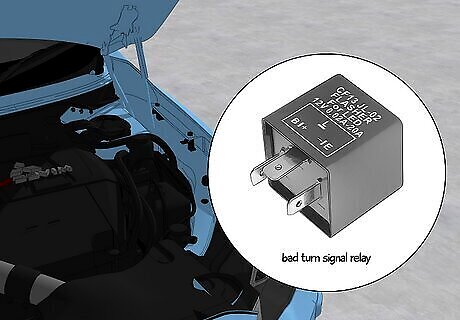
A bad turn signal relay can change your blinker's behavior. A turn signal relay (flasher relay) is an electronic device that controls the car’s turn signal lights. When it doesn’t work, it affects not only the turn sign but also the hazard lights. They may blink rapidly, stay on permanently, or fail to turn on at all. The Fix: Replace the relay. Locate the fuse box under the hood, dashboard, or footwell near the steering wheel. Remove the panel by hand and consult the diagram to locate the flasher relay. With the vehicle off, remove the relay with a pair of pliers. Push down on the wire connector to disconnect it and replace it with a new, matching relay. DIY Cost: $9 to $110. Professional Repair Cost: $180 to $250.
Dirty Combination Switch
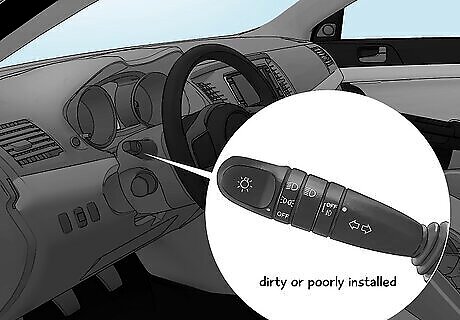
A dirty or poorly installed combination switch can disrupt the lights. One of the most used components of any vehicle is the combination switch. This switch operates the turn signals, windscreen wipers, and headlights. An incorrectly installed, loose, dirty ground connection can lead to a faster-than-normal turn signal. The Fix: You have to remove parts of the steering column for this one, so only attempt it if you have mechanical know-how. Disassemble the steering column to access the combination switch. If it appears dirty, remove debris buildup with a rag. If the switch is loose, this is an advanced DIY job, so leave it to a pro unless you’re experienced with wiring. Professional Repair Cost: $245 to $272.
Battery Issues
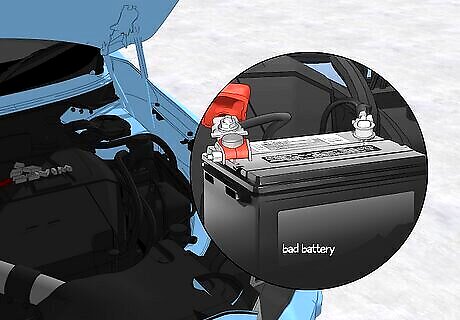
A bad battery can contribute to electrical issues in a vehicle. Your vehicle gets its electrical power from the alternator and battery. When either of these is working at a lower-than-normal performance range, it can cause a turn to blink fast or not at all, which can also affect the performance of the combination switch. The Fix: To change the battery, open your vehicle's hood with the engine off and disconnect the negative cable first. Then, disconnect the positive cable. Use a socket wrench to remove all the fasteners. Lift the battery out of the bay and slip the new battery in place. Secure it to the bracket and grease the terminals with lithium grease to prevent corrosion. Reconnect the positive cable, then the negative. DIY Cost: $100 to $160. Professional Replacement Cost: $45 to $250.
Failing Alternator
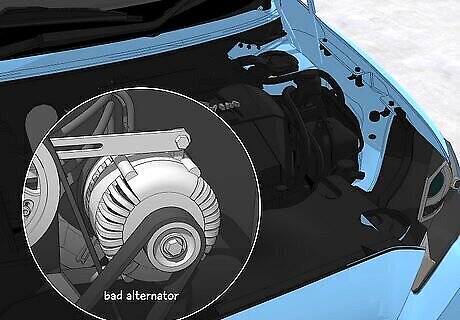
A dying alternator may cause the signal lights to flash inconsistently. A vehicle’s battery and alternator work hand-in-hand. If a battery warning light pops up or you have overly bright or dim lights, this can be a sign of a bad alternator. Similarly, you may see your headlights flicker along with your signal lights. The Fix: Replace the alternator. This is a difficult DIY, so contact your local mechanic unless you have experience working on cars. DIY Cost: $100 to $350. Professional Replacement Cost: $350 to $400.
Damaged Electrical Components
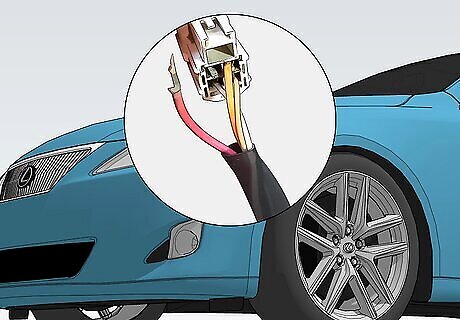
Fried, corroded, or worn wiring can increase a turn signal’s speed. Excessive heat, environmental factors, loose connections, water damage, or age can cause this problem, and it's important to address it quickly to avoid an electrical fire. The Fix: This is a difficult DIY that's best handled by professionals. If your electrical system is on the fritz, you may notice frequently blown-out fuses, a faster-than-normal turn signal light, or a burning smell. Unaddressed wiring issues can lead to an electrical fire and should be handled by an experienced professional. Professional Repair Cost: Depending on the issue, $1,000 to $1,500.




















Comments
0 comment